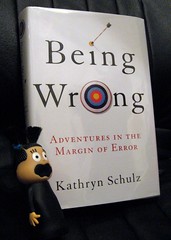I sometimes feel like I’ve been on the receiving end of a disproportionate number (or maybe just quality) of flat-out bad critiques. In saying that, I’m not saying that I’m a better writer or smarter or prettier than these critique partners (or that I’ve never had good critique partners, because I do have several)—but I’ve come to believe it takes special talent to read, comment on and “correct” eight, eighty or eight hundred pages and do nothing to improve the story. Especially when said story is mine, and thus, far from perfect.
Don’t we all want to develop our talents?! So, with much of the following based on actual feedback (but only a couple so noted), here’s some advice on
How to be completely unhelpful as a critique partner
Deliberately try to misread or misunderstand. If there’s any possible way this writing can be misinterpreted, no matter how much of a stretch, no matter if you understood perfectly the first four times you read it, no matter what variety of garbled English you’d have to speak to understand it that way, make a big note of how lost you are.
 Contradict yourself. Consistency is the hobgoblin of small minds. Or it isn’t.
Contradict yourself. Consistency is the hobgoblin of small minds. Or it isn’t.
Slavishly adhere to each and every rule you think you’ve ever heard or should use. Somebody once said something about never, ever, ever, ever using nouns, right?
Make an example of your critique partner. Why, just the other day, you and Completely Uninterested Party were discussing this principle. You must make DARN sure that this author knows it and knows it well after you’re through with her!
Overread. I think there really may be something more going on with this dialogue tag. “She said”? I think that must carry a lot of nuance. I don’t get it, though. Can you explain it better?
Underread. A page should take no more than 60 seconds to read and comment on. If all facts presented are not perfectly clear upon initial skim, the failing is obviously the author’s.
Take sarcastic pot shots at characters (or author). That whole too-stupid-to-live thing is so obvious it must be intentional. Maybe the writer’s equally stupid? The best way to point it out is to use “stupid” as often as possible, or whatever other word you want.
Be cruel. It’s called tough love for a reason. And who couldn’t use a thicker skin? Just wait for reviews.

Overexplain. Yeah, on all the other 25 pages the author conjugated her verbs right, but man, right here she didn’t. Let’s learn subject-verb agreement, shall we??
Highlight every instance of a mistake. There are ten sentences in the chapter where she uses “as”? Mark every single one. One author once said we can’t have anything happen simultaneously. Smiling and walking at the same time? Ridiculous! (Actual advice from a contest judge, not phrased that way.)
Assume nothing is intentional. They used the word “raven” three times in four pages? Ugh. Nobody would ever pay for such drivel. Or memorize it hundreds of years later.
Make no overall comments. She can figure out what I thought of it based on my line-by-line reactions.
Make no comments overall. Or not.
Make no comments on the text.
Make no comments in the text. And three to four sentences overall should be sufficient. For a whole manuscript. Make sure one of them was “Pretty good,” “Surprisingly competent,” or “I liked your font.”
Use your mother’s grammar rules on a deep POV passage. That character needs to go back to third grade if he says “like” instead of “as if.” (The grammar principle, not phrased this way, was advice I received in comments from a published contest judge. As. If!)
Don’t waste time thinking about your suggestions or their implications for the story. After all, what’s the writer’s job?
Don’t converse with your critique partner afterward, especially not to clarify anything you said. If they don’t get it, it’s not your problem. And if they try to contradict you under the guise of discussion? Cut all ties.
 Take absolutely none of their advice on your own work. They’re coming to you for help, aren’t they? How could they possibly improve your work?
Take absolutely none of their advice on your own work. They’re coming to you for help, aren’t they? How could they possibly improve your work?
Remind them what a favor you’re doing. Make sure they’re sufficiently grateful.
Don’t give examples or explain what you mean.
Point out the obvious. It helps them see it.
Make generic comments to point out weaknesses at the end of scenes, not where the problems occur. Oh, yeah, there was a problem like two or three pages ago, but that’s just so much scrolling. I’m sure she’ll figure out where I mean.
Make sure it’s written exactly the way you’d write it. The author’s voice? Pfft. Take it upon yourself to rewrite a scene to show her how it’s done. But don’t look back at their scene–their details might contaminate your brilliance.
Take everything literally. Figurative language is for wimps.
What do you think? How else can you be a completely unhelpful critique partner?
Photo credits: sign—Eric Kilby; cats—icanhascheezburger; thumbs down—striatic
 I think we’ve all been there: we get some piece of advice—from a crit partner, from an editor, from a total stranger—that just doesn’t work for our story.
I think we’ve all been there: we get some piece of advice—from a crit partner, from an editor, from a total stranger—that just doesn’t work for our story.  This phrasing comes from
This phrasing comes from  For the stuff that’s just off-base, it’s annoying. But for the things that come with that extra note of spite, it’s even harder. This is why I’ve come up with my coping mechanisms—if two other people agree with me, if I can just laugh at it sooner (and laugh at myself), then maybe I can move on faster, right?
For the stuff that’s just off-base, it’s annoying. But for the things that come with that extra note of spite, it’s even harder. This is why I’ve come up with my coping mechanisms—if two other people agree with me, if I can just laugh at it sooner (and laugh at myself), then maybe I can move on faster, right?
